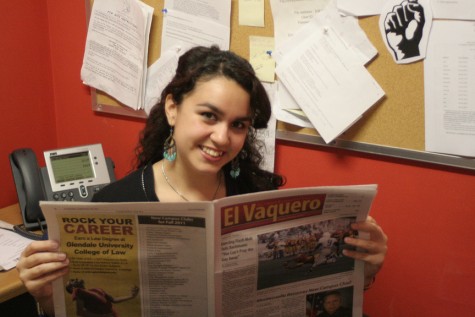Describing Mezklah’s music would be like describing Los Angeles to someone who has never been here – extensive and possibly inaccurate. Just as the city has a convergence of so many cultures, this group brings together the rhythms of various genres, and to get the drift of exactly what it is, one must consider each element.
Though I could talk for hours about this band’s style, this review is based only on their latest project for the sake of keeping the story a reasonable length.
Originally a duo comprised of Angel Garcia and Greg Hernandez, Mezklah has brought two new members to create their latest project, bassist Juan Carlos Ramirez and drummer Matias Pizarro.
As its purposely misspelled name implies – “mezcla” is the Spanish word for “mixture” – this Los Angeles-based alternative band is reluctant to fall into any kind category; for better or for worse, they’ve put together a second mishmash.
Mezklah’s “Bestia Sonika (The Sonic Beast)” is a compilation of four tracks that may be found under the category of world music. This EP, released in late October, combines dub reggae, rock, cumbia, and tribal electronica with Spanish lyrics and sometimes gibberish.
The first song, “Bestia (The Beast),” is a “cumbia sonidera,” a type of Mexican cumbia that is characterized for bringing Amerindian tribal sounds with modern electronic rhythms and textures.
The lyrics, rather than telling a story or attempting to bring about feelings, take you to the world of “the beast” in which the lives of mystical creatures such as prophets, sorcerers, jackals, wolf-men and goddesses revolve around cumbia and booze.
For its beat and theme, this song is great for letting go of all worries and certainly to enhance the effects of recreational drugs. However, its main chorus “La vallena va llena” (the whale is full) is just tossed out there with no purpose, other than having the second and fourth word rhyme. There’s no apparent relation of this phrase with the rest of the song.
“Poderosa (Powerful [female])” is the second song, and the most coherent of the four. With reggae’s one-drop rhythm, it alludes to the power of women’s charm, strength and sensuality and its effect on men. The gradual additions of electronic sounds give the calm reggae an enthralling ending.
The third song, “Curandera (Healer [female])” showcases the bands tribal tendencies in which prevalent drums and synthesizers embellish the otherwise unintelligible lyrics about superstitious practices.
“Chango Araña (Spider Monkey),” is a new version of one of the songs from their first album. It’s about the band’s vocalist and writer, Garcia, depicting his persona as a slippery, non-stopping spider monkey. This remake replaces the original electronic sounds in their first version with acoustic instruments. It’s slightly faster and accentuates the typical celebration mood of Latin Music.
To say that Los Angeles is a great city because of its diversity, means having to ignore the suffering that gang conflicts, narcotics, and poverty has caused to the city. To give this music the highest rating, I would have to base it only on its innovation and danceable rhythms and ignore the mess of their lyrics.
Though I enjoyed each of the nearly 50 times I listened to each track, I couldn’t understand about half of what they where saying. Some of it was dialect, but some just seemed like random words thrown together in a “mezcla.”
My rating: 2 out of 5 stars.
This EP can bought through cdbaby.com for $5 and Target for $10.95.
http://www.myspace.com/mezklah

